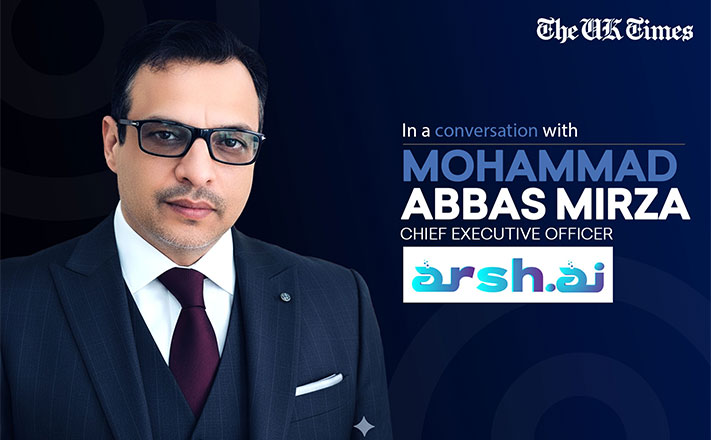Mohammad Abbas Mirza Interview
Mohammad Abbas Mirza, CEO of Arsh.Ai, is a technology leader with over 20 years of experience driving digital transformation, AI innovation, and cybersecurity for Fortune 500 companies and government agencies. Known for architecting purpose-driven, scalable AI solutions, he has led multi-million-dollar security programs, designed cloud-based healthcare platforms, and authored the award-winning book “Protect Your Personal Information.” At Arsh.Ai, Abbas champions intelligent transformation—creating AI systems that blend creativity, security, and practicality to help businesses solve complex challenges and seize new opportunities.
Architecting Intelligence with Purpose
We started the interview by asking, “Arsh.Ai is positioned as “Architecting Intelligence.” What does that mean in practice?”
Mohammad Abbas Mirza replied, “Architecting Intelligence” is more than a tagline it’s our guiding principle. At Arsh.Ai, we focus on building AI solutions that are purposeful, scalable, and impactful. Too often, AI is deployed as a buzzword without addressing real business challenges. Our approach is different: we design systems that blend creativity with computation, turning concepts into practical tools that deliver measurable outcomes. For example, we create AI agents that streamline workflows, automate repetitive processes, and enhance decision-making for organizations. It’s not about using AI for the sake of innovation; it’s about using it with intent whether to strengthen cybersecurity frameworks, optimize healthcare systems, or improve enterprise productivity. In essence, “Architecting Intelligence” is about aligning technology with human needs, ensuring that AI isn’t just intelligent, but also meaningful and transformative in the way it solves problems and empowers businesses to grow.”
A Breakthrough in Threat Detection
The UK Times: With 20+ years of experience across Fortune 500s and government agencies, what has been your most impactful project?
Mohammad Abbas Mirza replied, “Every project in my career has been significant in its own way, but the one that stands out most is my work with the U.S. Department of Homeland Security. I had the privilege of leading advanced cybersecurity initiatives, including a threat detection system that processed over 100,000 potential risks daily with an accuracy rate of 99.9%. This wasn’t just about technology it was about safeguarding national security and protecting critical infrastructure that millions of people rely on every day. Knowing that my contributions directly enhanced resilience against cyberattacks and strengthened national defense is something I take immense pride in. The impact of that project extended far beyond technical success; it was about trust, responsibility, and ensuring the systems we built could withstand evolving threats. That experience shaped my leadership philosophy focusing not just on innovation, but also on purpose and long-term security.”
AI’s Role in the Future of Cybersecurity
The UK Times: How do you see AI reshaping cybersecurity in the coming decade?
Mohammad Abbas Mirza replied, “Cybersecurity is moving into a new era, and AI will be the driving force behind it. Traditionally, security has been reactive we identify threats after they occur and then try to mitigate them. But AI has the power to change that model completely. In the coming decade, I see AI transforming cybersecurity into a predictive and adaptive system. It will anticipate vulnerabilities before they’re exploited, learn from behavioral patterns, and neutralize threats in real time. Imagine a security framework that evolves continuously, just like the threats it’s designed to stop that’s where AI is taking us. The integration of AI with zero-trust models, behavioral analytics, and autonomous response systems will mean organizations won’t just defend against attacks; they’ll stay a step ahead. This shift will make cybersecurity a strategic advantage rather than just a compliance measure, helping businesses operate with greater confidence in an increasingly digital world.”
Adapting AI across Diverse Industries
The UK Times: You’ve worked in industries ranging from healthcare to banking. How do you adapt AI strategies across such diverse sectors?
Mohammad Abbas Mirza replied, “The beauty of AI is its versatility, but success depends on context. While the underlying technologies remain consistent, each industry has its own unique priorities and challenges. In healthcare, the focus is on patient safety, compliance, and real-time monitoring. At Medinet RPM, for example, we leveraged cloud-based AI solutions to improve patient data accuracy and response times, directly enhancing care delivery. In contrast, the banking sector emphasizes risk management, regulatory compliance, and data security. At Wells Fargo, I led a corporate-wide data masking initiative across 200+ critical applications, ensuring compliance and safeguarding sensitive information. My approach has always been to start with listening understanding the pain points, regulatory landscape, and desired outcomes then tailoring AI frameworks to fit. The adaptability of AI lies not in its algorithms alone, but in how thoughtfully it’s applied. That’s where the real transformation happens: when AI respects the nuances of the industry it serves.”
Why Education Matters in AI Adoption
The UK Times: At Collin College, you led AI-driven PMO transformation. What role does education play in shaping AI adoption?
Mohammad Abbas Mirza replied, “Education is fundamental to AI adoption because true transformation starts with people, not technology. At Collin College, I had the opportunity to lead the creation of an AI-driven Project Management Office (PMO). The goal wasn’t just process optimization—it was about fostering a culture of adaptability, innovation, and growth. By integrating AI tools into project governance, we improved efficiency, collaboration, and decision-making across departments. But just as important was mentoring teams on how to use these tools effectively. Education played a vital role in helping staff see AI not as a replacement, but as an enabler. When professionals and students alike understand AI’s potential, they begin to innovate with it rather than fear it. This mindset shift is critical for the future. Institutions like Collin College are shaping the next generation of AI adopters, ensuring they have both the technical knowledge and the confidence to embrace change.”
Bridging the Gap through Knowledge
The UK Times: You are also an author recognized for your book on digital security. What inspired you to write it?
Mohammad Abbas Mirza replied, “The inspiration came from a simple realization: while corporations invest millions into cybersecurity, individuals often remain unaware of even basic digital safety practices. I wanted to bridge that gap. My book, “Protect Your Personal Information”, was written as a practical guide to help everyday people understand how to safeguard their data in a world where cyber risks are growing exponentially. It covers everything from password hygiene and phishing awareness to understanding privacy risks on social media. Receiving The Gold Seal of Literary Excellence was an honor, but the real reward was hearing from readers who felt more empowered and informed about their digital presence. For me, writing the book was about democratizing knowledge making cybersecurity less intimidating and more accessible. After all, security isn’t just an enterprise responsibility; it’s a personal one. Educating individuals is just as important as protecting organizations.”
The Long-Term Vision for Arsh.Ai
Lastly we asked, “What is your long-term vision for Arsh.Ai?”
“My long-term vision for Arsh.Ai is to become a global leader in purposeful AI innovation building systems that not only transform enterprises but also create lasting societal impact. Too often, AI is developed without clear alignment to human needs. At Arsh.Ai, we’re committed to changing that by designing intelligent systems that are ethical, transparent, and scalable. I see us enabling businesses of all sizes whether startups or Fortune 500s to harness AI for smarter operations, stronger security, and better decision-making. But beyond business, I also envision contributing to broader challenges, such as secure digital ecosystems, healthcare accessibility, and workforce empowerment through automation. Our mission is clear: we don’t just use AI, we design it with purpose. The future of AI shouldn’t just be about faster machines or smarter algorithms it should be about creating technology that genuinely improves lives and empowers people everywhere.” Mohammad Abbas Mirza concluded
Connect with Mohammad Abbas Mirza on LinkedIn
For more information visit Arsh AI
Also Read:
Interview with Cllr Fatima Zaman on Mental Health
Dr. Sofica Bistriceanu’s Journey
Interview with Andres Prieto Anton























